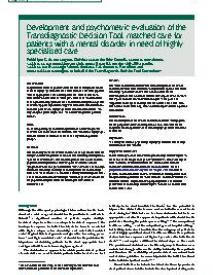Development and psychometric evaluation of the Transdiagnostic Decision Tool : matched care for patients with a mental disorder in need of highly specialised care
Background
Early identification of patients with mental health problems in need of highly specialised care could enhance the timely provision of appropriate care and improve the clinical and cost-effectiveness of treatment strategies. Recent research on the development and psychometric evaluation of diagnosis-specific decision-support algorithms suggested that the treatment allocation of patients to highly specialised mental healthcare settings may be guided by a core set of transdiagnostic patient factors.
Aims
To develop and psychometrically evaluate a transdiagnostic decision tool to facilitate the uniform assessment of highly specialised mental healthcare need in heterogeneous patient groups.
Method
The Transdiagnostic Decision Tool was developed based on an analysis of transdiagnostic items of earlier developed diagnosis-specific decision tools. The Transdiagnostic Decision Tool was psychometrically evaluated in 505 patients with a somatic symptom disorder or post-traumatic stress disorder. Feasibility, interrater reliability, convergent validity and criterion validity were assessed. In order to evaluate convergent validity, the five-level EuroQol five-dimensional questionnaire (EQ-5D-5L) and the ICEpop CAPability measure for Adults (ICECAP-A) were administered.
Results
The six-item clinician-administered Transdiagnostic Decision Tool demonstrated excellent feasibility and acceptable interrater reliability. Spearman's rank correlations between the Transdiagnostic Decision Tool and ICECAP-A (−0.335), EQ-5D-5L index (−0.386) and EQ-5D-visual analogue scale (−0.348) supported convergent validity. The area under the curve was 0.81 and a cut-off value of ≥3 was found to represent the optimal cut-off value.
Conclusions
The Transdiagnostic Decision Tool demonstrated solid psychometric properties and showed promise as a measure for the early detection of patients in need of highly specialised mental healthcare.
Geachte bezoeker,
De informatie die u nu opvraagt, kan door psychotraumanet niet aan u worden getoond. Dit kan verschillende redenen hebben,
waarvan (bescherming van het) auteursrecht de meeste voorkomende is. Wanneer het mogelijk is om u door te verwijzen naar de bron
van deze informatie, dan ziet u hier onder een link naar die plek.
Als er geen link staat, kunt u contact opnemen met de bibliotheek,
die u verder op weg kan helpen.
Met vriendelijke groet,
Het psychotraumanet-team.
In: BJPsych Open ; ISSN: 2056-4724 | 6 | 5 | september | e93
https://doi.org/10.1192/bjo.2020.74


